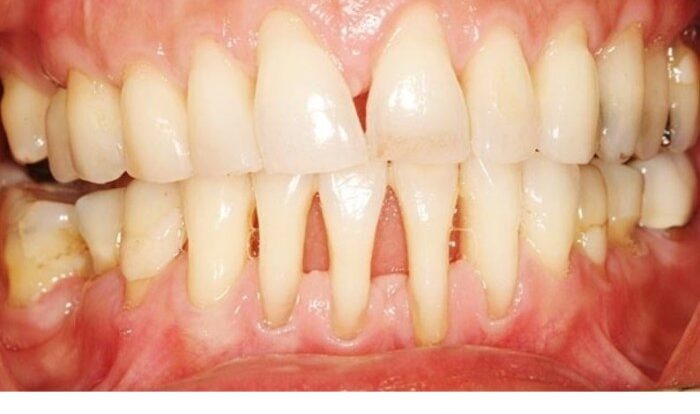
How to cure gum disease without a dentist – Gum disease, a common dental issue, can be effectively treated at home without the need for a dentist. From natural remedies like tea tree oil and turmeric to proper home care techniques and lifestyle modifications, this comprehensive guide explores how to cure gum disease naturally.
Discover the power of natural remedies, learn the secrets of proper oral hygiene, and understand the impact of lifestyle choices on gum health. Embark on a journey towards a healthier smile, one step at a time.
Natural Remedies for Gum Disease

Gum disease is a common problem that can lead to pain, bleeding, and even tooth loss. While there are a number of conventional treatments for gum disease, there are also a number of natural remedies that can be effective in preventing and treating this condition.
Gum disease can be a real pain, but you don’t always have to go to the dentist to cure it. There are a few simple things you can do at home to get rid of gum disease. For more information on how to cure gum disease without a dentist, click here . It’s easy, and it can save you a lot of money and time.
So what are you waiting for? Start curing your gum disease today!
One of the most effective natural remedies for gum disease is tea tree oil. Tea tree oil has antibacterial and anti-inflammatory properties that can help to reduce inflammation and kill bacteria that cause gum disease. To use tea tree oil for gum disease, simply add a few drops to a glass of water and rinse your mouth for 30 seconds.
Gum disease is a common problem that can lead to serious health issues if left untreated. While it’s best to see a dentist for professional treatment, there are some things you can do at home to help cure gum disease without a dentist.
For more information on how to cure gum disease without a dentist, visit this website.
You can also apply tea tree oil directly to your gums using a cotton swab.
If you’re looking for ways to cure gum disease without a dentist, there are a few things you can do. You can try using a mouthwash that contains chlorhexidine, which is an antibacterial agent that can help to kill the bacteria that cause gum disease.
You can also try using a toothpaste that contains fluoride, which can help to strengthen your teeth and prevent cavities. If you have severe gum disease, you may need to see a dentist for treatment. However, if you catch it early, you may be able to cure it on your own with some simple home remedies.
For more information on how to cure gum disease without a dentist , check out this article.
Another effective natural remedy for gum disease is salt water rinses. Salt water can help to reduce inflammation and kill bacteria. To make a salt water rinse, simply dissolve 1/2 teaspoon of salt in a glass of warm water. Rinse your mouth with the salt water for 30 seconds, then spit it out.
Turmeric is another natural remedy that can be effective in treating gum disease. Turmeric has anti-inflammatory and antioxidant properties that can help to reduce inflammation and protect your gums from damage. To use turmeric for gum disease, you can either take a turmeric supplement or add turmeric to your food.
It is important to note that natural remedies are not a substitute for professional dental care. If you have gum disease, it is important to see a dentist to get a proper diagnosis and treatment plan.
Home Care Techniques
Proper home care is crucial in preventing and treating gum disease. Here are some essential techniques to follow:
Brushing and Flossing
Brushing your teeth twice daily with a soft-bristled toothbrush and fluoride toothpaste is essential. Use gentle circular motions and angle the brush at a 45-degree angle to the gum line. Flossing once a day helps remove plaque and bacteria from between teeth where brushing cannot reach.
Antimicrobial Mouthwashes
Antimicrobial mouthwashes can help reduce the number of bacteria in the mouth and control plaque formation. Choose mouthwashes containing chlorhexidine or cetylpyridinium chloride for maximum effectiveness.
Other Tips
- Avoid sugary and acidic foods and drinks, as they promote bacterial growth.
- Quit smoking, as it weakens the immune system and increases the risk of gum disease.
- Visit your dentist regularly for professional cleanings and checkups.
- Consider using an electric toothbrush, which can be more effective at removing plaque than manual brushing.
Lifestyle Modifications
Maintaining a healthy lifestyle plays a significant role in preventing and managing gum disease. Understanding the impact of diet, habits like smoking and alcohol consumption, and stress on gum health is crucial. Incorporating healthy lifestyle changes can support gum disease treatment and promote overall oral health.
Diet
A balanced diet rich in essential nutrients is crucial for maintaining gum health. Incorporate plenty of fruits, vegetables, and whole grains into your meals. These foods are packed with antioxidants, vitamins, and minerals that support gum tissue health and prevent inflammation.
Smoking and Alcohol Consumption, How to cure gum disease without a dentist
Smoking and excessive alcohol consumption can significantly contribute to gum disease. Nicotine in cigarettes constricts blood vessels, reducing blood flow to the gums and impairing their ability to fight infection. Alcohol can dehydrate the body and reduce saliva production, creating an environment conducive to bacterial growth.
There are a few things you can do to help cure gum disease without a dentist. First, you should try to brush your teeth twice a day with a fluoride toothpaste. You should also floss your teeth once a day.
These two things will help to remove plaque and bacteria from your teeth and gums. You can also try using a mouthwash that contains fluoride. How to cure gum disease without a dentist . Finally, you should try to eat a healthy diet that includes plenty of fruits, vegetables, and whole grains.
Stress Management
Chronic stress can weaken the immune system and increase susceptibility to gum disease. Engage in stress-reducing activities such as exercise, yoga, or meditation to manage stress levels. Adequate sleep and relaxation can also contribute to overall well-being and support gum health.
Dental Procedures

When home remedies and lifestyle changes are insufficient, dental procedures may be necessary to treat gum disease effectively.
Scaling and Root Planing
Scaling and root planing are non-surgical procedures commonly used to treat gum disease. Scaling involves removing plaque and tartar from the teeth’s surfaces and below the gum line. Root planing smoothes the tooth roots, making it more difficult for bacteria to adhere.
Gum disease can be a pain, but you don’t always need a dentist to cure it. There are plenty of home remedies you can try, like gargling with salt water or using a mouthwash with chlorhexidine. If you’re looking for a more comprehensive approach, you can check out Duval Mecconline . They offer a range of treatments for gum disease, from scaling and root planing to laser therapy.
Whatever you choose, make sure to take care of your gums to avoid further problems.
Benefits of scaling and root planing include:
- Reduced inflammation and bleeding
- Improved gum health
- Prevention of further bone loss
Antibiotics
Antibiotics may be prescribed in severe cases of gum disease to eliminate bacterial infection. Common antibiotics used include amoxicillin, metronidazole, and tetracycline.
Antibiotics can be effective in reducing inflammation and preventing the spread of infection. However, it’s crucial to complete the entire course of antibiotics as prescribed to prevent antibiotic resistance.
Risks and Complications
While dental procedures are generally safe, some potential risks and complications may occur:
- Bleeding and discomfort:Scaling and root planing can cause temporary bleeding and discomfort.
- Tooth sensitivity:Root planing can expose the tooth roots, leading to increased sensitivity to hot or cold temperatures.
- Gum recession:Scaling and root planing may cause some gum recession, but it is usually minimal and does not affect the overall health of the gums.
- Rare complications:In rare cases, dental procedures can lead to infections or damage to the teeth or gums.
It’s important to discuss the potential risks and benefits with your dentist before undergoing any dental procedures.
Alternative Therapies
Alternative therapies offer potential benefits in treating gum disease, alongside conventional dental procedures. They may alleviate symptoms, improve healing, and enhance overall oral health. However, it’s crucial to consult a healthcare professional before using these therapies.
Acupuncture
Acupuncture involves inserting thin needles into specific points on the body. It is believed to stimulate the body’s natural healing response and reduce inflammation. Studies have shown that acupuncture may alleviate gum pain, improve blood circulation, and promote tissue regeneration.
Laser Therapy
Laser therapy utilizes low-level lasers to target bacteria and stimulate tissue growth. It is effective in reducing gum inflammation, promoting healing, and inhibiting bacterial growth. Laser therapy is often used as an adjunct to traditional treatments, enhancing their effectiveness.
Ozone Therapy
Ozone therapy involves administering ozone gas to the affected area. Ozone has antimicrobial properties that can kill bacteria and reduce inflammation. It is commonly used as a supplementary treatment to conventional methods, enhancing the overall therapeutic effect.
Last Word: How To Cure Gum Disease Without A Dentist
By embracing natural remedies, maintaining good oral hygiene, and making positive lifestyle changes, you can effectively cure gum disease at home. Remember, prevention is always better than cure, so continue to practice good dental habits and visit your dentist regularly for professional checkups.
FAQs
Is it possible to cure gum disease without a dentist?
Yes, it is possible to cure gum disease at home using natural remedies and lifestyle changes. However, severe cases may require professional dental treatment.
What are the best natural remedies for gum disease?
Effective natural remedies include tea tree oil, salt water rinses, and turmeric. These remedies have antibacterial and anti-inflammatory properties that help reduce inflammation and promote healing.
How often should I brush and floss my teeth?
Brush your teeth twice a day and floss once a day to maintain good oral hygiene and prevent gum disease.





